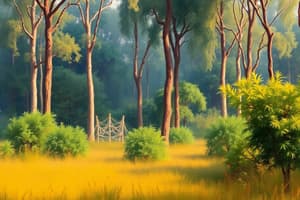Podcast
Questions and Answers
What are evergreen forests commonly characterized by?
What are evergreen forests commonly characterized by?
- Presence of cacti and succulents
- Growing primarily in deserts
- Trees shedding all their leaves at the same time
- Trees appearing green throughout the year (correct)
Which type of forest primarily experiences a hot and dry summer followed by heavy rainfall?
Which type of forest primarily experiences a hot and dry summer followed by heavy rainfall?
- Deciduous forests (correct)
- Evergreen forests
- Thorn forests
- Mountain forests
What significant ecological role do forests play in addition to providing timber and non-timber products?
What significant ecological role do forests play in addition to providing timber and non-timber products?
- They attract more wildlife to urban areas
- They decrease rainfall by increasing temperature
- They prevent soil erosion and control floods (correct)
- They create deserts and dry areas
What type of plants is primarily found in thorn forests?
What type of plants is primarily found in thorn forests?
Where are evergreen forests predominantly located in India?
Where are evergreen forests predominantly located in India?
Which type of forest is also known as coniferous forests?
Which type of forest is also known as coniferous forests?
Which of the following trees is commonly associated with deciduous forests?
Which of the following trees is commonly associated with deciduous forests?
How do trees in thorn forests adapt to prevent water loss?
How do trees in thorn forests adapt to prevent water loss?
What type of trees are predominantly found in the mountain forests of India?
What type of trees are predominantly found in the mountain forests of India?
What is the primary purpose of mangrove trees having roots that grow above the ground?
What is the primary purpose of mangrove trees having roots that grow above the ground?
What was the innovative method used by villagers in Uttarakhand to prevent deforestation?
What was the innovative method used by villagers in Uttarakhand to prevent deforestation?
What is one impact of deforestation mentioned?
What is one impact of deforestation mentioned?
Which initiative is celebrated at the start of the rainy season to encourage tree planting?
Which initiative is celebrated at the start of the rainy season to encourage tree planting?
Which of the following is NOT a government response to forest conservation in India?
Which of the following is NOT a government response to forest conservation in India?
Which of these national parks is located in Madhya Pradesh?
Which of these national parks is located in Madhya Pradesh?
What is a significant consequence of the decrease in forest area in India?
What is a significant consequence of the decrease in forest area in India?
Flashcards are hidden until you start studying
Study Notes
Natural Vegetation in India
- Natural vegetation refers to trees and plants growing naturally in a region, determined by climate and soil.
- Importance of forests:
- Provide timber for construction and furniture.
- Source of fuelwood, wood pulp, paper, rubber, gums, resins, dyes, and medicines.
- Prevent soil erosion and control floods.
- Supply oxygen to the air and increase rainfall through cooling effects and water vapor release.
- Provide shelter to wildlife and are essential for many tribal communities.
Types of Forests in India
- Five main types of forests:
- Evergreen forests: Found in hot, humid areas with abundant rainfall. Trees remain green throughout the year as they don't shed leaves simultaneously. Examples include rosewood, ebony, and mahogany. Found in the Western Ghats and northeastern states (Assam, Arunachal Pradesh, Meghalaya, Tripura).
- Deciduous forests: Found in areas with hot, dry summers followed by heavy rainy seasons. Trees shed leaves during the dry season. Also called monsoon forests. Examples include teak and sal trees. Predominant in the southern plateau and Himalayan foothills.
- Thorn forests: Found in areas with very low rainfall. Short, thorny trees like kikar and babul, and thorny shrubs are common. Needle-like leaves or spines reduce water loss. Predominant in Rajasthan, Gujarat, and parts of the Deccan plateau.
- Mountain forests (Coniferous forests): Found in cold, mountainous regions. Predominant trees are conifers (tall, cone-shaped, with needle-like leaves). Examples include pine, spruce, fir, and oak. Located in the Himalayan region.
- Tidal (Mangrove) Forests: Found in river deltas like Ganga, Mahanadi, and Godavari. Grow in salty, marshy areas that are flooded during high tides. Mangrove trees have roots that grow above ground for breathing. Famous example is the Sundarbans in the Ganga Delta.
Conservation of Forests and Wildlife
- Deforestation is a significant problem in India, leading to soil erosion, landslides, floods, and threats to wildlife.
- Chipko Movement: A grassroots movement in the hills of Uttarakhand, where villagers embraced trees to prevent their felling in 1974.
- Government initiatives for conservation:
- Encouraging tree plantation during Vana Mahotsav.
- Declaring reserved forests where cutting trees and killing wildlife are prohibited.
- Establishing protected areas like wildlife sanctuaries and national parks.
- Important protected areas:
- Corbett National Park (Uttarakhand), Kaziranga National Park (Assam), Sundarbans Tiger Reserve (West Bengal), Gir National Park (Gujarat), Kanha National Park (Madhya Pradesh), Periyar Wildlife Sanctuary (Kerala).
Studying That Suits You
Use AI to generate personalized quizzes and flashcards to suit your learning preferences.




